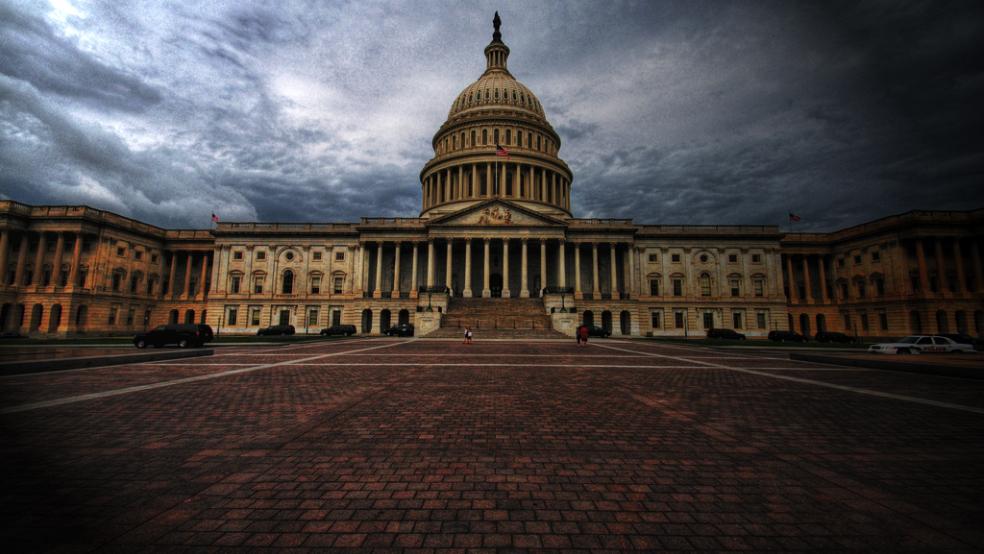When will the government shutdown end? The wisdom of the crowds says October 18.
That's the average bet in a prediction market operated by American Civics Exchange, a startup launched by two investment professionals and former state legislative candidates who want to apply the methods of futures trading to the world of government policy.
The market uses play money for now. Once all their paperwork is approved by the Commodity Futures Trading Commission, founders Flip Pidot and Paul Lang hope to operate a fully functioning futures market in government policy outcomes.
The market will be something like a betting parlor for companies, investors and policy wonks. It will allow groups with an economic interest in some outcome, say Congress passing a new tax reform plan or the Food and Drug Administration approving a new cancer drug, to hedge against negative outcomes the same way oil companies hedge against a drop in prices.
RELATED: CONTINUING RESOLUTION: BUDGET TOOL FOR DYSFUNCTION
Disinterested speculators who don't otherwise have skin in the game will also be able to bet on those markets when they think they can turn a profit.
"That's a very big category of financial risk that impacts many different sectors," Pidot said, "but there's no effective risk market now the way there is for everything from agricultural prices to weather fluctuations."
While the shutdown market is operating with play money, American Civics Exchange is offering a $100 prize to the trader who most closely guesses when Congress and the White House will reach a deal to end the budget impasse. This is the first time the group has offered a cash prize.
"Even though there's no actual financial exposure for the traders, we're hoping having some tangible, real money incentive will push them to play well and trade rationally," Pidot said. "It's our hope, and our thesis, that this will yield more accurate prices in terms of predictive capacity."
RELATED: HOW LONG WILL SHUTDOWN LAST? 3 MAJOR SIGNS
The futures market may not offer better predictions than pundits or polling data, Pidot said, but that's not its main goal.
"From our perspective, if the market is working well it's not so much about accurately predicting whether something will or won't take place," he said. "It's whether the market price represents the view of the market as a whole."
Pidot and Lang ran an earlier market that took bets on whether the Supreme Court would strike down the individual mandate at the heart of President Obama's health care reform law, for instance. That market showed high odds the mandate would be overturned. In that case, Pidot said, the market accurately reflected public perception even though that perception turned out to be wrong.
The team also ran a market on whether or not the government would shut down October 1 because Congress had failed to pass a budget or continuing resolution to pay the bills. About 80 percent of traders thought the government would shut down.
They have other markets going on whether Congress will vote to raise the debt ceiling to avoid a government default by October 17 and whether Greece will exit the European common currency.
American Civic Exchange typically launches markets on policy questions that have a binary, yes-or-no outcome and that are likely to have a broad economic impact, Pidot said. They made an exception in the case of the shutdown date because the issue isn't easy to phrase in a yes or no way.
The play money site has only drawn a few hundred traders so far, Pidot said. Many of the site's visitors were former traders on Intrade, the Irish betting market that gained fame for trading on the outcome of 2012's U.S. presidential election, Pidot said.
Intrade went offline in March after citing "financial irregularities." Academics have since found one supporter of Republican nominee Mitt Romney gambled $4 million on the contest in an apparent attempt to game public perception about the state of the race. Intrade was cited heavily by U.S. news outlets in the run-up to Election Day.
The U.S.-based American Civics Exchange is barred from offering betting markets on the outcome of political contests by reforms in the 2010 Dodd-Frank financial reform law, Pidot said. Dodd-Frank also bars U.S. markets from taking bets on anything related to terrorism, war, assassinations, and anything else that regulators conclude is "contrary to the public interest."
The Defense Advanced Research Projects Agency proposed a futures market in 2003 to plumb the wisdom of the masses to predict the likelihood of terrorist attacks against certain targets or the assassination of foreign leaders. The project, called the Policy Analysis Market, was scrapped after Sens. Ron Wyden, D-Ore., and Byron Dorgan, D-N.D., slammed it publicly.
The senators argued the market could allow terrorists to anonymously profit from their own attacks. They also said the idea of the U.S. government taking bets on foreign leaders being murdered was morally repugnant and grotesque.
Read more at Next-Gov




